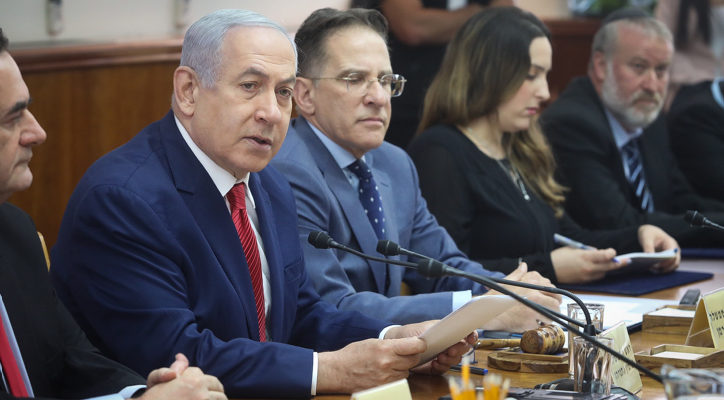The cabinet agreed to send the ‘Cameras Law’ to the Knesset for a vote.
By World Israel News Staff
Israel’s cabinet passed the controversial ‘Cameras Law’ during its weekly Sunday meeting. It will now go to the Knesset for a vote on an accelerated timetable in a day or two, Israel Hayom reports.
The draft law, which has been fiercely debated for some weeks in Israel’s media, is a result of irregularities and counting fraud coming to light during the April election.
According to the legislation, “every member of the elections committee, observer, secretary or representative representing the elections committee, can document visually or vocally everything he’s authorized to oversee in order to fulfill his task.”
Prime Minister Benjamin Netanyahu, a staunch supporter of cameras in polling places, said at the cabinet meeting, “The integrity of elections is among the foundations of democracy. The best way to prevent fraud in the elections is to station cameras in every polling place and allow poll watchers from the rival parties to supervise each other.”
“Reciprocal oversight of all the parties is the essence of transparency in a democracy and one of the most important foundations in upholding the rule of law. Therefore, cameras in polling places in the hands of poll watchers are a necessary means to assist in maintaining the integrity of the elections,” he said.
The legislation is mired in controversy with both the chairman of the Israeli Elections Committee Hanan Meltzer and the Attorney General Avichai Mandelblit opposing it.
Mandelblit attended the cabinet meeting to express his opposition. He had said earlier in his opinion on the law that while he supported cameras in polling places in principle, he opposed the timing of the law, given it fell so close to election day and may interfere with the smooth running of the elections.
Support or opposition to the law has broken down along the lines of Left and Right. Netanyahu and other right-wing politicians have come out in favor of the law while left-wing politicos have spoken out against it.
The Labour-Gesher party is enlisting the help of the Kibbutz movement to go to the polls in Druze and Arab neighborhoods to try and prevent Likud volunteers from setting up cameras, Israel Hayom reports. “We won’t let Bibi steal the elections,” party representatives said, referring to Netanyahu by his nickname.
Left-wing Democratic Union head Nitzan Horowitz tweeted on Sunday, “The cameras are designed to wipe out the election. If the camera hijacking passes in the Knesset, there will be chaos at the ballot box and the voting will fail.
“If there are no cameras, Bibi will say (he’s already saying) that huge fraud endangers the Likud (most of the fraud was in favor of the Likud) and will cause a riot at the polls and claim that the elections are invalid. It’s a kind of coup. We have reached the red line of democracy.”
Netanyahu emphasized at the cabinet meeting that the draft law will only place cameras in the polling places and not behind the screen where people cast their ballot.
“The secrecy of the vote will be strictly maintained… No special preparations, training or equipment is necessary. Any poll watcher can film with his cellphone. This is what happens in our public space: Everyone photographs, everything is an Instagram story, every grocery has cameras, then the hall at the polling place cannot be photographed?
“Cameras in polling places for the integrity of the elections – it is simple, it is fair, it is transparent and it is just.”
“One cannot explain why photography is restricted precisely in the only public place where transparency is required more than any other. We will submit the issue for legislation in order to ensure that the coming elections will be clean, supervised and exact, just as the citizens of Israel expect from us,” the prime minister said.





